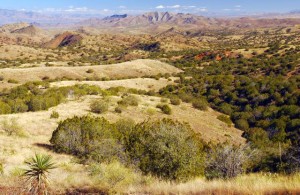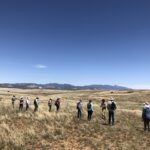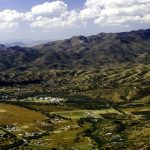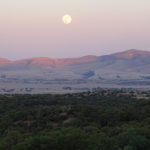ADEQ decision ruled “not supported by evidence” and “an abuse of discretion”
Save the Scenic Santa Ritas Media Release
(Phoenix, Ariz.) A Maricopa County (AZ) Superior Court today overturned a key air pollution permit for Toronto-based Hudbay Minerals’ proposed Rosemont copper mine. Judge Crane McClennen ruled the Arizona Department of Environmental Quality (ADEQ) acted “contrary to law” in its January 2013 decision to issue Rosemont the permit.
In completely adopting the evidence and arguments presented by SSSR, the court found the state relied on flawed data provided by Rosemont that was designed to understate the air pollution impact of the proposed $1.5 billion open pit copper mine.
McClennen stated in his ruling that ADEQ’s decision to issue the permit “was arbitrary and capricious,” an “abuse of discretion,” and “not supported by substantial evidence.”
The ruling came in response to a lawsuit filed by Save the Scenic Santa Ritas (SSSR), a southern Arizona coalition opposing the mine. SSSR provided evidence that Rosemont had manipulated its data in an attempt to convince ADEQ that pollution from the mine would not violate applicable air quality and health standards. SSSR showed if appropriate modeling were used, Rosemont’s operations wouldindeed violate these standards.
“Rosemont has a long history of playing fast and loose with the facts,” said Gayle Hartmann, SSSR’s President. “They expect ADEQ and other regulatory agencies to just rubber stamp their projects, but this time they both got caught. The court agreed with us that ADEQ did not do an adequate and proper job of evaluating Rosemont’s application.

Proposed Rosemont Copper Mine Site. Photo courtesy Arizona Mining Reform Coalition.
Rosemont is seeking state and federal permits to blast a massive open pit copper mine in the Santa Rita Mountains on the Coronado National Forest near Tucson. The air pollution permit is one of the several permits that Hudbay needs, but still doesn’t have, before it can begin operations at the mine site.
Today’s ruling means ADEQ will have to re-evaluate the air permit in light of additional data and analysis presented by SSSR showing the mine would violate state air quality and health standards.
At a hearing before an Administrative Law Judge last year, air quality experts working with SSSR provided evidence revealing that Rosemont selected an extremely low data measurement threshold for its ADEQ permit application in a manipulative attempt to show that mine operations would not exceed air quality standards.
Rosemont also did not tell ADEQ that it had provided data to the U.S. Forest Service, at that agency’s request, showing that using even a slightly higher measurement threshold would cause the mine to violate air quality standards. SSSR emphasized the significance of the report to the Forest Service proving that violations would occur.
Attorneys for Rosemont acknowledged to Judge McClennen in January that the company provided ADEQ with air pollution data that was substantially different than what the company gave to the U.S. Forest Service.
In particular, Rosemont chose to use a 5% ratio of nitrogen dioxide to nitrogen oxide pollution in its air pollution model, even though it had no hard data proving that 5% was the appropriate ratio to use. In fact, Rosemont had looked at how much pollution would be emitted using ratios of 5%, 10%, and 30%, but decided to give ADEQ only the 5% data results – the only level not showing a violation of air quality and public health standards.
By comparison, the Environmental Protection Agency, which oversees the Clean Air Act, recommends a default ratio of 50% when, as here, there is no hard data supporting a lower ratio.
“Rosemont can’t have it both ways,” said local physician Dr. Tom Purdon who also sits on the SSSR Board of Directors. “They tell the Forest Service one thing and then tell ADEQ something very different. What that tells southern Arizonans is that Rosemont still can’t be trusted. And it’s our health that would be jeopardized if the mine violates air quality standards.”
The Court ruling can be downloaded here.
Save the Scenic Santa Ritas is a non-profit organization working to protect the Santa Rita and Patagonia Mountains from environmental degradation caused by mining and mineral exploration.











